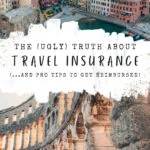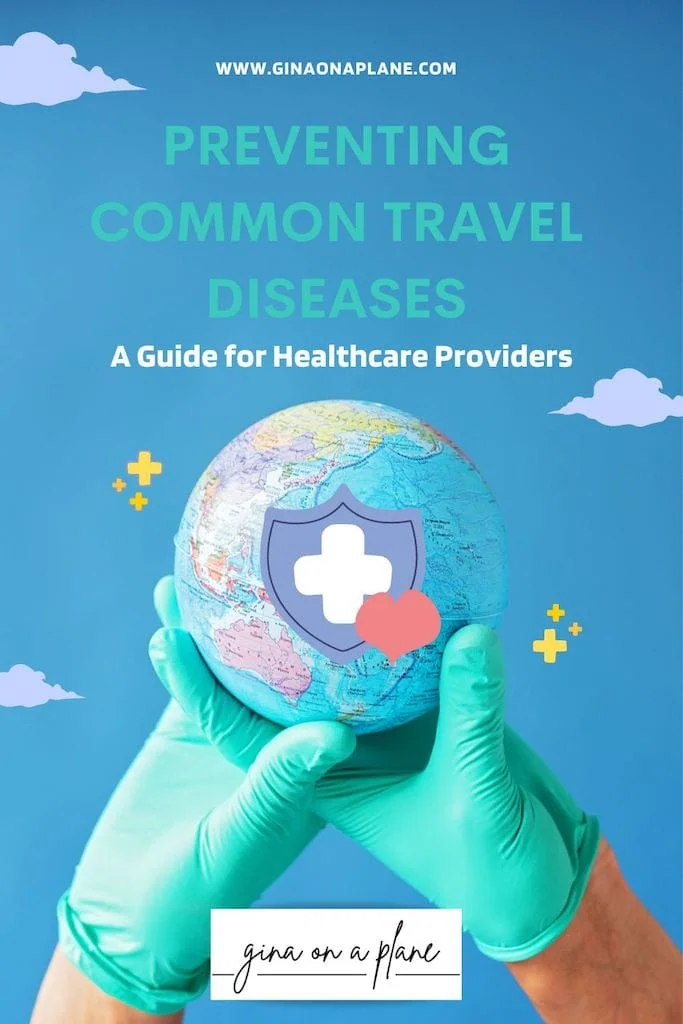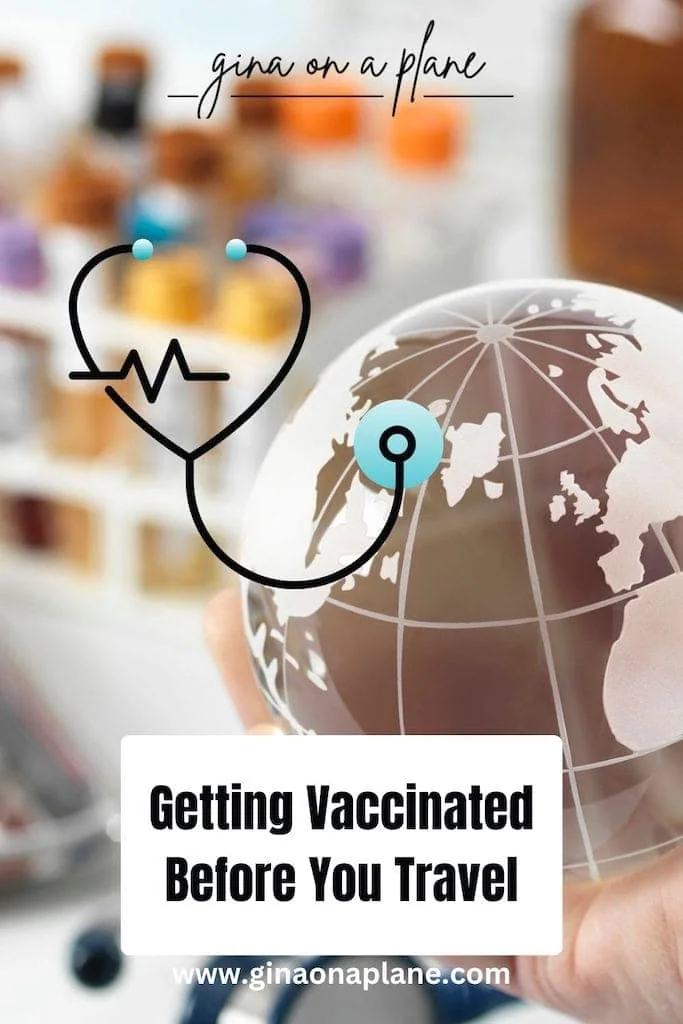If you’ve read articles about saving money on trips, you’ve probably come across a few that boast the benefits of having travel insurance and getting reimbursed for unforeseen expenses. You may have wondered if travel insurance is actually worth it. While I definitely think the answer is yes, I also think there are some caveats you need to know.
I have seen MANY articles that make it seem like getting reimbursed for travel inconveniences is like a walk in the park:
“If something goes wrong on your trip, just submit it to your insurance company and everything is covered!”
“My flight got cancelled, and I had to stay the night in a hotel, eat another meal out, plus breakfast in the morning, not to mention get rebooked on a different flight, and my insurance paid for all of it!”
When I created this website, I made a promise to myself and my readers that I would always be honest with you about everything I post. So that’s why I’m here to tell you that getting reimbursed for travel expenses due to trip delays, cancellations, and other things that go wrong is actually a huge pain in the ass. Don’t get me wrong – I still think having travel insurance is vital in most instances, and I recommend it to all my readers. But I also think you should know what to expect when you go to get something reimbursed, and that’s why I wrote this post. To discover all my pro tips for standing the best chance of getting reimbursed through a travel insurance company, keep scrolling!

Why Do People Make It Seem Like Getting Reimbursed is Easy?
A lot of times, I see this with people who have their travel insurance through their credit cards. Some blogs will try and tell you how easy it is to get reimbursed and then give you the link to the credit card they use. They want the points when you apply for the card through their link.
While I love travel points just as much as the next person, I also love you, my readers…which is why I would never lie to you and say that “getting reimbursed is easy!” It isn’t.
This post is dedicated to the ugly truth about travel insurance, and all the things you need to know to stand the best chance of getting your travel claims reimbursed. Plus, I included some examples of where getting reimbursed didn’t go as planned, and what I would have done differently next time. Keep reading!
Why Is It So Hard to Get Things Reimbursed Through Travel Insurance Companies?
Whether your travel insurance is through your credit card company or through a third party, the answer is going to be the same: Because companies don’t want to pay for anything if they don’t absolutely have to.
I have had to turn things in to my credit card insurance company on 3 trips now, and each time, I had to make constant submissions before they would approve my claim. The number of documents you have to upload, receipts you need to keep, and screenshots of your bank statement you have to take is insane.
You have to know the exact amount that you want reimbursed, which can sometimes be a challenge if you went to another country (your receipts and invoices will be in whatever currency that country uses).
I have also had to write letters explaining where certain things were on my statements, receipts, and invoices, even though to me it was obvious that I was uploading the correct documents that they wanted. It shouldn’t be this time-consuming, but it is!
And It’s Not *Just* Insurance Companies…
As I write this, I am thinking about how I upgraded my flight during my Christmas trip, and I’m STILL waiting for my checked bags and purchased seats to be reimbursed to me through TAP Air Portugal. I took my Christmas trip in November-December. It is now mid-March.
I submitted my refund request through the TAP Air website, and got a confirmation email 2 months later saying that I would receive a refund. I still haven’t gotten it. I can’t tell you how many phone calls I’ve made to this airline, how many people told me they’d “let the claims department know,” how many other people reassured me my refund was coming, and I STILL don’t have it….
I’ll keep you posted on the outcome, but you might be waiting awhile…😑
**Update** – As of January 1, 2024, Tap Air Portugal will NO LONGER refund you your bags or pre-paid seats if you upgrade to executive class.
All the things I write about in this article about getting reimbursed also encompasses getting refunds through specific companies outside of your travel insurance. Sometimes, your insurance company will require you to submit a letter saying that the airline, train station, etc. is not going to reimburse you for your cancelled ticket before they will issue you a refund.
So, that’s ANOTHER phone call you have to make. That’s ANOTHER email you have to send. That’s MORE TIME that you have to wait.
Because of this, I have outlined my pro tips & rules for using travel insurance below:
Travel Insurance
Pro Tips & Rules to Live By
- Document, document, document! – This is the most important thing you can do. Take pictures, screenshots, anything that you can use as evidence that your trip got cancelled or delayed.
- Try and get a refund with a specific company first – such as the airline, if your flight gets cancelled. Make sure to get the response in writing.
- Don’t ever book anything you couldn’t normally afford – if your flight gets cancelled and you need to spend another night in a hotel, don’t book anything out of your regular price range.
- Keep all your receipts, ask for paper invoices, and then take pictures of everything – you will need proof of your documents to get reimbursed (this includes restaurant receipts, gas station receipts, etc.)
- Your receipts and invoices need to show the details – make sure anything you upload shows your name, the charge, and the name of the company (hotel/train/restaurant, etc)
- If you have travel insurance through your credit card company, make sure to use that same card during your entire trip – you will only get reimbursed for what you buy with this specific card
- Circle/highlight where you paid for things that you want reimbursed on your credit card statement – the insurance company will ask for this to be uploaded, and it’s easier if you can point out the charges you want reimbursed.
- Read the fine print before rebooking anything – so you know what is covered and in what situations
- Follow up…and follow up AGAIN – if things are taking longer than they should to get reimbursed, I recommend following up on a weekly basis.
And Getting Reimbursed for Travel Expenses is Even Harder in Other Countries…
As you can imagine, if you need to be reimbursed for anything while traveling overseas, this throws another wrench into the mix as you’re now dealing with international companies. Most of the time, your receipts and invoices will be given to you in the currency of whatever country you visit, and you’ll have to highlight where those charges were converted to dollars on your bank statement.
Getting reimbursed for things can also be difficult if the airline or hotel is headquartered and/or based out of another country (for example, TAP Air Portugal). I have had unfortunate luck on trains in Canada and Germany when it comes to getting reimbursed.
Story Time! “I Didn’t Get Reimbursed in Canada”
Once, my train broke down from Montreal to Québec City, and I was not able to get a refund for my ticket. I was only able to receive a travel credit, meaning I could use it to pay for my next trip on the VIA Rail Canada train within the next 6 months. That doesn’t do me much good if I live in America and don’t travel to Canada often!
Story Time! “I Also Didn’t Get Reimbursed in Germany”
Another time, my train in Munich was cancelled due to a snowstorm. I booked my ticket on the OMIO app, which is who I thought I would get a refund from. Turns out, despite purchasing on the app, my refund needed to come from the Deutsche Bahn, the national railway company of Germany. To issue me a refund, they needed my IBAN and BIC numbers. (wait…my WHAT!?)
If you live in Europe, you are able to route money to peoples’ bank accounts using a BIC code and an IBAN number.
- The BIC (Bank Identifier Code) is a number that identifies banks globally.
- The IBAN number identifies a person’s specific bank account.
The United States doesn’t use IBAN or BIC codes. Instead, we use SWIFT codes, which are similar to BIC codes in that they are specific to a certain bank – in other words, a “bank identifier.” You can contact your local bank and get their SWIFT code.
I got my bank’s SWIFT code along with my account number and mailed it overseas to the Deutsche Bahn (yes…the DB uses PAPER MAIL if you aren’t in Europe. More time you have to wait!!!).
What happened? The DB sent me a mailed letter back, stating they still needed my IBAN number. You know, the IBAN number that I don’t have, because I’m an American….
How to Increase Your Chances of Getting Reimbursed: What I Would Have Done Differently in the Above Situations
If you run into a situation like the ones I encountered in Canada and Germany, you can try to keep the statement from the train station saying they will only issue you a credit and turn that in to your travel insurance. However, a better idea would be to contact the train station and get a letter saying that they WILL NOT refund you for your delayed or cancelled trip. Make it clear that you live out of the country and will have no use for their voucher, and you need this to turn in to your travel insurance company.
Often times, travel insurance companies expect you to get a refund from the service provider in these scenarios. If you get a letter stating that you will not get reimbursed for your expenses, your travel insurance company is much more likely to reimburse you.
In Germany, what I also could have done is wait in line at the customer service counter at the train station and have them automatically refund my ticket. At the time, I had no idea that the OMIO app would not refund me, and also had never even heard of an IBAN or BIC code (not that it would have helped me anyway!).
Regardless what country you are in, if there is a customer service counter available for the thing that you are trying to get refunded for, take advantage of it. Even if they can’t reimburse you on the spot, they will give you the best instructions for how to get your money back.
So…Is Getting Travel Insurance Even Worth It?
I would absolutely say YES, travel insurance is worth it. You just have to make sure you know what it covers and don’t spend money on things that are outside of your means.
IMO, it is always better to have coverage than not have it. Just know that if you do have to get reimbursed for something, the process will likely be slow, painful, and require multiple emails and/or phone calls.
What is the Best Travel Insurance to Get?
A lot of times when you are booking trips, you will be asked towards the end if you want travel insurance on your flight, your hotel, your rental car, etc. While you could certainly say yes to any of these, it’s likely going to cost you more money in the long run.
IMO, the best option for getting travel insurance is to invest in a good travel credit card that has travel insurance included as a benefit.
- Exception: Should you need cancel-for-any-reason insurance, check out the website linked for some highly rated options. This will likely be more expensive than other types of insurance, but you would be covered in any situation.
I have the Chase Sapphire Reserve card, which includes travel insurance that covers me in almost any situation as long as I meet the criteria.
This is so important. You MUST be familiar with the criteria to know what will be covered.
Reading The (Not-So-Fine) Fine Print
Don’t get me wrong, I love my Chase card. But I also go into each trip knowing what they will pay for and what they won’t should I get myself into a situation (and yes, I know all this because I had to learn it the hard way.)
Example #1
One of the things Chase travel insurance covers is trip cancellations or interruptions. However, the cancellation or interruption must meet certain criteria, such as sickness or weather-related cancellation. If your friend bails on you at the last minute and you want to cancel your trip, that won’t be covered (and in this case, I’d just go solo and have the time of my life!).
Example #2
Chase also offers trip delay coverage, but your trip must be delayed by at least 6 hours for the Sapphire Reserve card and 12 hours for the Sapphire Preferred card in order to get reimbursed.
Pro Tip: Travel insurance offered by credit cards are NOT cancel-for-any-reason. A lot of times, I will make sure that things I book in advance are refundable up to a certain date, such as excursions through companies like Get Your Guide or Viator. I almost never book a hotel room that isn’t refundable either.
Since Chase is the only credit card I have, this is the only one that I can speak to as far as what I know about their benefits. So far, I have been happy with the perks that Chase offers. To view the full list of card benefits, check out the Chase website.
Below, a quick comparison of Chase’s 2 non-specific travel cards:
Chase Visa Travel Credit Cards
At-A-Glance
Chase Visa has 2 main credit cards for all-encompassing travel:
Chase Sapphire Reserve and Chase Sapphire Preferred.
Chase Sapphire Reserve
- Chase’s premium travel card; has excellent travel benefits
- Annual fee = $550/year; but worth it if you travel often
- Better travel insurance benefits
Chase Sapphire Preferred
- Good travel benefits, but not as extensive as the Reserve
- Annual fee = $95/year
- Good for people who travel some but not too often
What Does Chase Sapphire Travel Insurance Cover?
- Trip Cancellation and Interruption
- Trip Delay Reimbursement*
- Baggage Delay
- Lost Luggage
- Primary Rental Car Insurance*
- Roadside Assistance*
- Travel and Emergency Assistance Services
*= denotes differences between coverage based on what card you have









